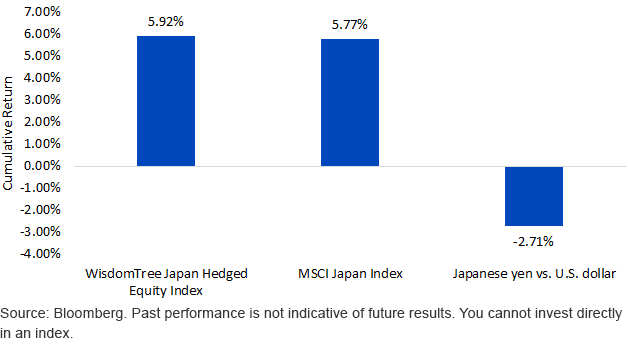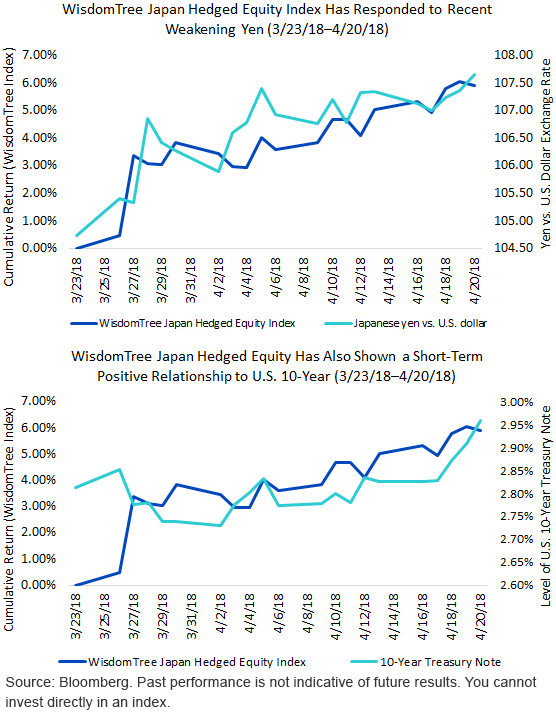WisdomTree launched its first ETFs in June of 2006, pioneering the concept of fundamental weighting. WisdomTree sponsors distinct ETFs that span asset classes and countries around the world.
How a Weaker Yen Affects Japanese Exporters
It is widely known that Japanese equities tend to have an inverse relationship to the performance of the yen. Namely:
- When the yen is appreciating, Japan’s stocks face a stiff headwind and tend not to deliver their strongest returns.
- When the yen is depreciating, Japan’s stocks tend to find themselves in a much more favorable environment and have delivered much stronger performance.
When we look thus far at 2018, data from Japan’s Ministry of Finance has indicated that more than $30 billion has left Japanese equities from foreign investors. 1 Clearly, foreign investors haven’t been happy with Japan as an allocation, and a probable factor contributing to this activity is that people have seen the headline number for the Japanese yen/U.S. dollar exchange rate touching below 105—quite a strong level!
Warning: Yen Does Not Move in a Single Direction
While foreign investors would clearly prefer to see the yen/U.S. dollar exchange rate touching levels above 110 and moving toward 120, we caution them not to forget about Japan just because the yen is currently on the stronger end of its trading range. Markets can move quickly, and during bouts of yen weakness, Japanese equities can be interesting tactical trading ideas.
Example: March 23, 2018, to April 20, 2018, Saw a 2.71% Yen Depreciation—What Did Equities Do?
Japan's Equities Reacted Well to Recent Yen Weakness ( 3/23/18–4/20/18)
- Clearly, Japan’s equities reacted well to the downward movement in the yen.
- The WisdomTree Japan Hedged Equity Index focuses its approach on exporters—this would lead us to expect that it should respond more strongly to the yen’s moves. We see here—admittedly over a short period—that this was the case compared to the broader MSCI Japan Index .
Key Relationships: The Yen and U.S. 10-Year Treasury Note Interest Rates
- On the left side, we can see the clear relationship between a weakening yen against the U.S. dollar and the performance of the WisdomTree Japan Hedged Equity Index. This is highly related to our first chart—it just shows a way to look at the relationship from a more “across time” or “ correlation ” perspective.
- On the right side, we can see that there is also a relationship between the WisdomTree Japan Hedged Equity Index and the level of the U.S. 10-Year Treasury note. Historically, we’ve seen a positive correlation between a rising U.S. 10-Year note and the performance of the WisdomTree Index shown here—and with the 10-Year getting very close to 3%, it is important to bring this relationship back to the forefront.
In 2018, the yen had been one of the strongest-performing currencies, despite the rise in the 10-Year. In late April, the yen started coming under more pressure that coincides with the rise in U.S. versus Japanese yield differentials.
We’d point out that from a pure equity valuation perspective, we find Japan to be one of the more attractive markets globally. This starts with the compensation an investor takes to own equities over safer assets like bonds. The earnings yield risk premium over Japanese bond yields is among the highest globally—given a 10-year Japanese government bond yield that is anchored near zero and an earnings yield on WisdomTree’s Index that is almost 7.8%. The comparable ratio for the S&P 500 Index is below 2% given a trailing 12-month price-to-earnings (P/E) ratio that is more than 20x and a 10-year bond yield that is approaching 3%.
Japan’s Equities Look Extremely Attractive Compared to Government Bonds

In our view, if tensions over global trade recede and North Korea risk also seems to fade, Japanese equities seem poised for recovery.
1 Sources: Bloomberg, Japan Ministry of Finance, based on data with one-week lag in reporting, current as of 4/13/18.
RSS Import: Original Source
Investors should carefully consider the investment objectives, risks, charges and expenses of the Funds before investing. U.S. investors only: To obtain a prospectus containing this and other important information, please call 866.909.WISE (9473), or click here to view or download a prospectus online. Read the prospectus carefully before you invest. There are risks involved with investing, including the possible loss of principal. Past performance does not guarantee future results.
You cannot invest directly in an index.
Foreign investing involves currency, political and economic risk. Funds focusing on a single country, sector and/or funds that emphasize investments in smaller companies may experience greater price volatility. Investments in emerging markets, real estate, currency, fixed income and alternative investments include additional risks. Due to the investment strategy of certain Funds, they may make higher capital gain distributions than other ETFs. Please see prospectus for discussion of risks.
WisdomTree Funds are distributed by Foreside Fund Services, LLC, in the U.S. only.




